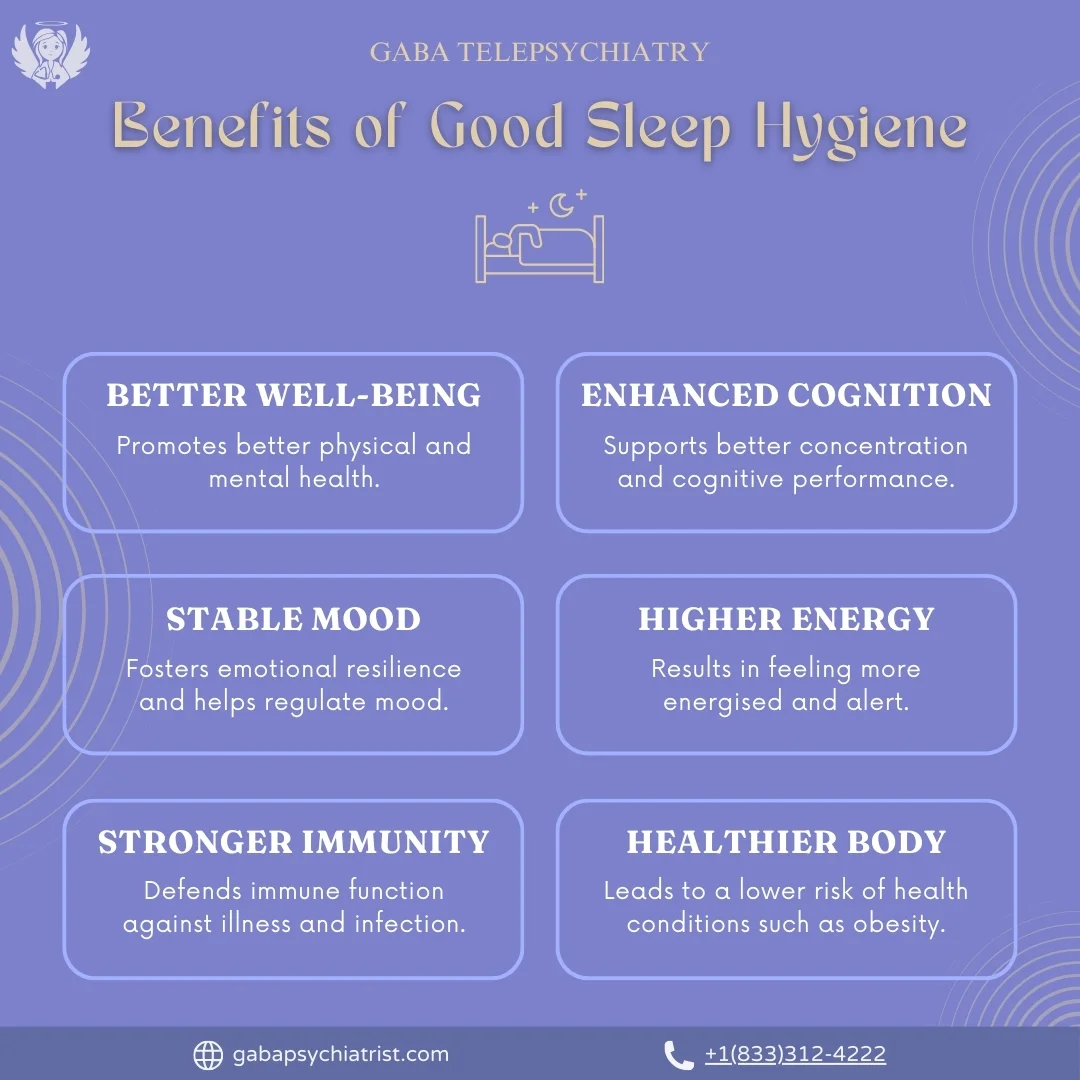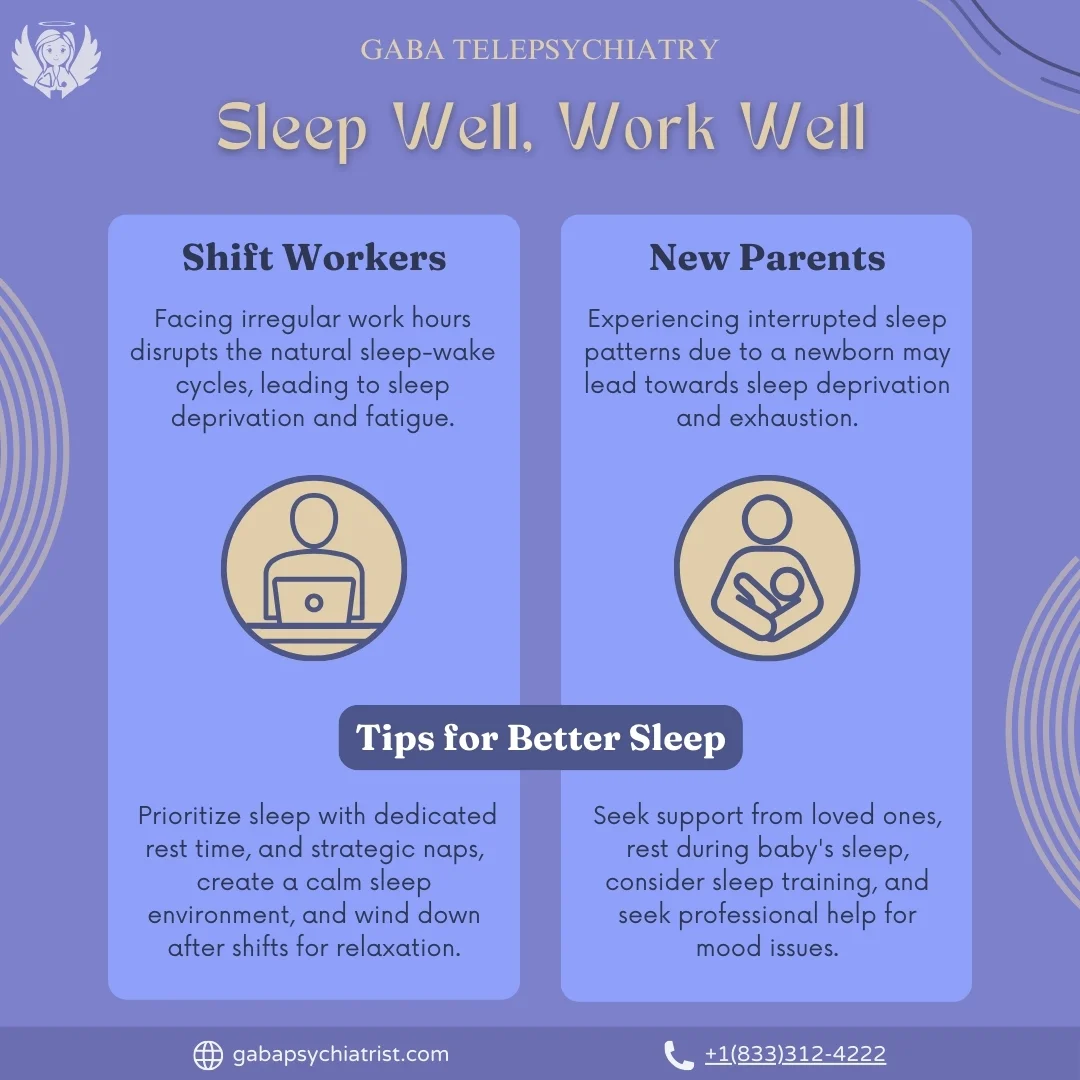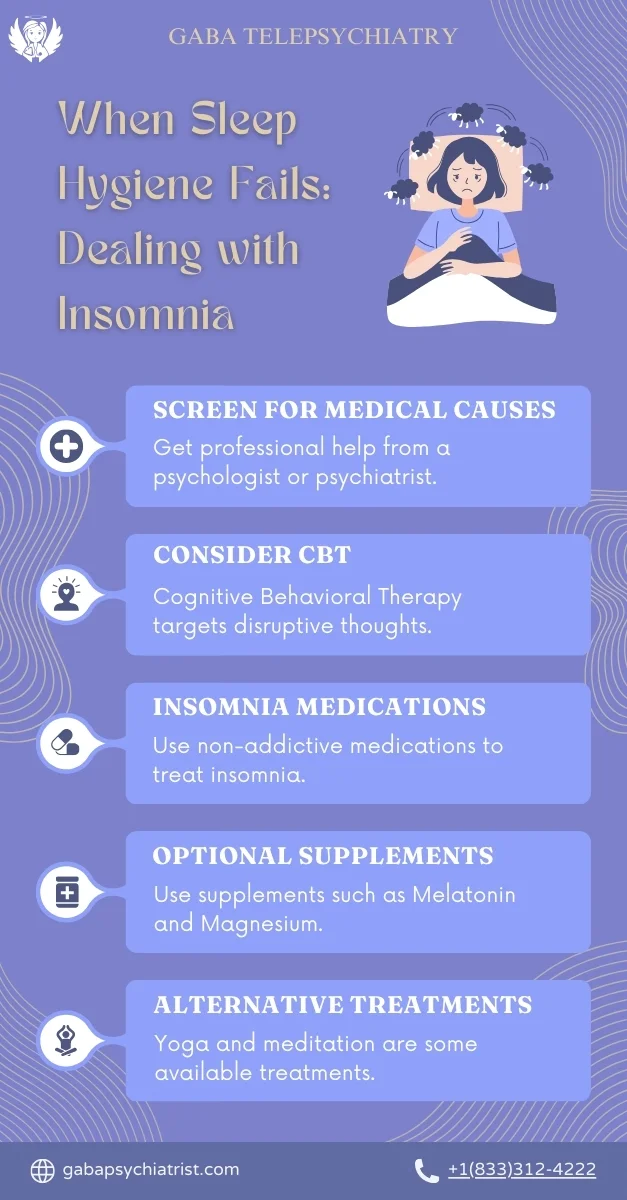It is common to come across the fact that the most successful people follow disciplined schedules. They usually have unique sleeping habits – such as waking up early, going to bed early, and having a sound sleep for a fixed number of hours every day. All these habits contribute to their increased productivity and high energy levels, which is why they can achieve commendable milestones in life.
So, good SLEEP HYGIENE seems to be a secret behind their consistent performance. But, what does ‘Sleep Hygiene’ mean? And how can it affect your health and lifestyle? Let’s see!
What is Sleep Hygiene ?
Sleep Hygiene means the routine or habits you follow to put yourself to regular and restful sleep. Put simply, it refers to ‘healthy sleeping habits’ that help you strike a balance in your daily life.
Sleep hygiene extends way beyond small habits such as brushing your teeth or washing your face before going to bed. It is about science-backed practices that you should integrate into your lifestyle to achieve healthy and sound sleep.
A healthy sleep schedule is an important part of a healthy lifestyle. Your sleep routine determines the quality of your:
- Cognitive functioning
- Mental health
- Mood
- Metabolic health, and
- Cardiovascular health
Apart from being a biological necessity, sleep also improves your well-being and quality of life. It is vital for people of all age groups – children, adolescents, and adults.
Why is Sleep Hygiene Important?
Following healthy sleep hygiene will benefit both your mental and physical health, by elevating the overall quality of your life. You may think that being grumpy in the morning is the only side-effect of lack of good sleep. But, it affects you in numerous other ways in the long run.
Healthy sleeping habits can help you in:
- Staying alert throughout the day, increasing your productivity, and focusing on better results in academic, personal, or professional life
- Strengthening your immune system by aiding in weight management and curbing serious health conditions such as depression, heart disease, and diabetes
- Elevating your mood and memory, so that you can achieve better comprehension, learn new things easily, and remember information
- Improving your confidence levels and reducing anxiety
- Managing your timetables effectively, so that you can make time for activities you cherish the most, such as spending time with your loved ones
How to Implement Good Sleep Hygiene ?
Implementing good sleep hygiene is a process that involves integrating useful habits and fixing bad ones. You can do many things – big and small – to achieve the desired sleep hygiene levels. Here are some ways to achieve good sleep hygiene and leverage all its benefits:
- Create a Consistent Sleep Framework – When you set up a fixed time to go to bed and wake up every morning, your body develops an automatic internal clock. With a consistent sleeping schedule, you will be able to develop a routine and manage your entire day in a better manner.
- Follow a Relaxing Bedtime Routine – Before going to bed, make sure you do something you enjoy. It may be taking a hot shower, reading your favorite book, or meditating for a while.
- Have Some Digital Detox Time – At least one hour before you go to bed, make sure your devices have maintained distance from you. Since sleep and screens are incompatible, this step is essential to put your mind to rest.
- Limit Consumption of Stimulants – We all love that hot cup of coffee to buzz away all the stress. However, stimulants such as tea, coffee, and cola can disrupt your sleep.
- Limit Consumption of Alcohol – Alcohol alters your sleep architecture and impacts it negatively. Drinking alcohol can lead to restless sleep and disrupt your sleep depth and quality. It is common to wake up with tiredness and fatigue the next morning and have your productivity levels drop drastically.
- Make Time for Exercise – Integrating an exercise schedule into your everyday life can help you in many ways. A fulfilling session of your favorite workout will help improve the quality of your sleep, and reduce mental health concerns.
- Choose Your Food Wisely – Foods that trigger indigestion, such as fried and oily foods, citrus fruits, extra spicy food, and heavy meals can affect your sleep quality. Such food causes heartburn and disturbs your stomach before bedtime. It is always wise to choose your last meal as per your sleep routine.
Consequences of Poor Sleep Hygiene
Poor sleep hygiene may result in sleep disruptions, which can further lead to adverse short-term and long-term health consequences. If you do not look after your sleep hygiene, you may encounter problems with:
Thinking, Concentration and Memory:
When you don’t get enough rest, your brain is likely to encounter difficulty in maintaining your thinking abilities, concentration levels, and memorizing capacities. This is because it forms connections that help you remember and process new information while you’re asleep.
Mood Levels:
It is common to feel how having a bad sleep makes you feel quick-tempered and moody. That is why maintaining proper sleep hygiene is vital to keep your mood levels elevated throughout the day. Poor mood levels may even lead to anxiety and depression.
Immunity:
It may sound surprising, but lack of proper sleep weakens the defenses of your body against many viruses. Bad sleep might make you fall sick very easily when you are exposed to such germs.
Blood Sugar Levels:
People who don’t get enough sleep are prone to developing insulin resistance, which may lead to the risk of developing Type-2 Diabetes.
Blood Pressure Levels:
Poor sleep hygiene may cause high blood pressure levels. Typically, individuals who sleep for less than five hours a day are at grave risk of messing up their blood pressure and contracting heart diseases.
Sex Drive:
Sleep hygiene is also associated with sex hormone levels in the body. A drop in these levels due to bad sleep might decrease your sex drive.
Body Balance:
If you don’t look after your sleep hygiene, you may suffer from poor balance and coordination. This can make you prone to physical accidents and unwanted injuries.
Benefits of Good Sleep Hygiene
The greatest benefit of mastering this practice is, of course, enjoying a fulfilling and deep sleep every night. No matter what you might be dealing with, good quality sleep is a miraculous remedy that makes you feel energized, alert, and ready to face every challenge that lies ahead. You will start to look at life with a better perspective, which exhibits positivity, enthusiasm, and high zeal.
Working on your sleep hygiene will make it easier for you to navigate through your lifestyle. When you designate enough hours to sleep every day, your body starts to function better. You will not only experience superior physical performance, but your mental health will also get a lot better. Be it your blood sugar, blood pressure, immunity, or mood and concentration, every aspect of your body starts to heal. This means, you now have a reduced or even no need for medication of any kind – a big sign of a healthy lifestyle!
Sleep hygiene also protects you from sleep disorders such as Insomnia, Sleep Apnea, Parasomnias, etc. It acts as a natural or alternative remedy for such sleep disorders, which are usually treated by a qualified regular or Online Pyschiatrist.
If you are experiencing symptoms like difficulty falling asleep, fatigue in the daytime, a strong desire for daytime naps, lack of concentration, weight gain, unusual movements while sleeping, anxiety, etc., you should immediately consider seeking psychiatric help.
At Gaba Telepsychiatry, our goal is to provide the highest quality care to patients, who otherwise would not be able to access care from the provider of their choice either because of geographic location or scheduling difficulty.
What if Sleep Hygiene is not effective, and I still can’t sleep?
If lack of sleep is persistent, chronic, interfering with your day-to-day life, and sleep hygiene is not working, it is possible that you are suffering from a sleep disorder like Insomnia. Here’s what you can do in such a situation;
- Screen for Medical Causes: Seek professional help from a psychologist or psychiatrist about your condition. Your medical practitioner will screen you for all possible medical causes that are interfering with your sleep.
- Consider Cognitive Behavioral Therapy (CBT) for Insomnia: Cognitive Behavioral Therapy is an effective and long-term treatment for Insomnia. It will help you which thoughts or behaviors are causing you sleep troubles. It is generally the first recommendation as an Insomnia treatment, as it can help you get rid of your worries and negative thoughts that keep you awake.
- Consider Insomnia Medicine: Medicine is another way of treating such sleep disorders. At Gaba Telepsychiatry, psychiatrists prefer non-addictive medications for the treatment of insomnia. Often, sleep medications stop working after a while and have to be rotated with medications that work on different receptor systems to avoid resistance and tolerance.
- Consider Supplements for Insomnia: You may also try using supplements to aid your sleep. There are several natural remedies to help you sleep better – such as Melatonin, Valerian Root, and Magnesium. When paired with good sleep hygiene, such supplements usually result in better quality sleep.
- Consider Alternative Treatments for Insomnia: Apart from therapy, medicines, and supplements, you can try some great alternative treatments like Yoga, Meditation, Acupuncture, Deep Tissue Relaxation, and Hypnosis.
Shift Work and Sleep Hygiene
Sleep hygiene is especially important for people doing shift work. The temptation is often not to sleep during the day, and miss a couple of nights of sleep, or just sleep two or three hours and catch up every few days. As well as being disastrous for your mental and physical health, it can lead to poor work performance and loss of employment.
As a shift worker, you should try to sleep for at least 7-9 hours per 24 hours, prioritize your sleep, use napping as a helpful practice, consider alcohol and nicotine intake, have an exercise routine, and have a comfortable sleep environment.
Sleep Hygiene for New Mothers
Babies take about three months to develop a wake-sleep cycle, and this may cause problems in the sleep schedules of the mothers. New mothers are overburdened with a lot of responsibilities, which makes it difficult to develop sleep hygiene and look after their health.
As a new mom, here’s what you can do to fix your sleep hygiene:
- Prioritize your sleep
- Reduce other responsibilities until your baby develops a sleep cycle
- Don’t shy away from taking help from loved ones
- Use helpful tools like breast pumps to avoid breastfeeding during sleep hours
- If ‘baby blues’ don’t go away for a very long time, screen for Postpartum Depression and seek professional help




